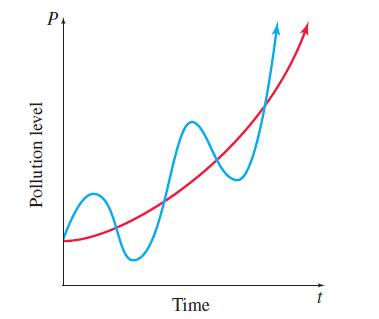The amount of pollution in the air fluctuates with the seasons. It is lower after heavy spring
Question:
The amount of pollution in the air fluctuates with the seasons. It is lower after heavy spring rains and higher after periods of little rain. In addition to this seasonal fluctuation, the long-term trend in many areas is upward. An idealized graph of this situation is shown in the figure below. Trigonometric functions can be used to describe the fluctuating part of the pollution levels. Powers of the number e can be used to show the long-term growth. In fact, the pollution level in a certain area might be given by P(t) = 7(1 - cos 2πt)(t + 10) + 100e0.2t, where t is time in years, with t = 0 representing January 1 of the base year. Thus, July 1 of the same year would be represented by t = 0.5, while October 1 of the following year would be represented by t = 1.75. Find the pollution levels on the following dates.
(a) January 1, base year
(b) July 1, base year
(c) January 1, following year
(d) July 1, following year
Step by Step Answer:






